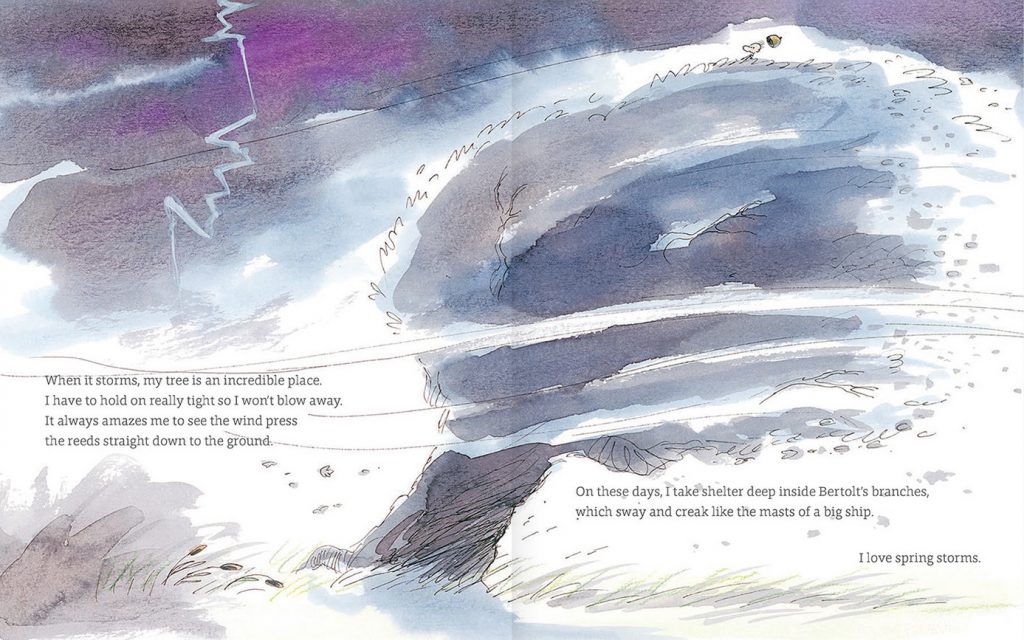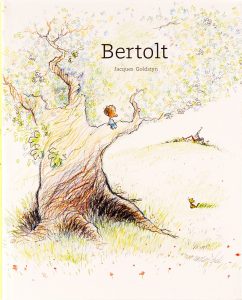Bertolt is a tree and a book. Bertolt, the tree, is an enormous, old oak who must be five-hundred years old. Bertolt, the book by Jacques Goldstyn, measures barely 6″ x 8″ and, at the time of writing, is just three years old. And yet this little book, which is a delight to hold in one or two hands, contains not only the venerable eponymous oak, but a story and wisdom besides!
Start by opening Bertolt and you’ll meet a nameless little protagonist—Bertolt’s best friend—who happily confides:
me—I’m what you call a loner
I do stuff all by myself
and it doesn’t bother me one bit.
Just the opposite.
A loner’s life needn’t be short of “stuff”, of course. Our hero is an avid, joyous observer of people and nature, and a friend to many (wonderfully illustrated) animals and birds. He finds his greatest happiness hiding in Bertolt’s branches—”a cave, a maze and a fortress”— from where he can watch others or just stare off into the distance. “When I climb up high, I can see for miles around,” he says. And our little loner never feels lonely up there, for all he is alone.
This nameless little chap is also full of a quirky creativity that he puts to use in brightly coloring the world around him. From the simple pleasures of deliberately mismatching his gloves and playing alone in the snow, to the extraordinary garlanding at this tiny tome’s climax, the products of his creativity delight and reassure him.
So now consider this: what can even the most adept loner do when the leafy branches of their beloved tree are no longer available as the platform of their daily life?
And during our current pandemic, what should our many urban loners do as Covid-19 closes the doors of their favorite bars, restaurants, cinemas, coffee shops etc., and forces them into the monotonous solitude of the same four walls day after day?
Bertolt, in a subtle and charming way examines and responds to these questions, providing what may prove timeless comfort to those who struggle with being alone in difficult times.

Without giving the story away, our little hero finds himself faced with a crisis of loss. Alone, he must somehow make sense of his transformed world and learn acceptance of what cannot be changed. And it is during this trial that we see his imagination reach a zenith from where his creativity can bring solace, acceptance and a rebirth of joy into his world—and the book we’re reading.
Heady stuff, I’ll admit—and yet, I challenge any reader not to find a deep celebration of creativity’s salutary powers in the pages of this inspiring little book.
And for loners—or the lonely—reading Bertolt at a time when places and activities we cherish are no longer available to us, perhaps there is something further to learn from the example of this diminutive artist. He recreates his world based on the possible, after all. And though creativity and imagination may not be a complete medicine, their processes and results do deliver a practical antidote to nostalgia, longing, and even grief.
Creativity is, in short, a life-affirming fusion of the possible with the newly imagined. And Bertolt deftly illustrates that being alone is an excellent time to get creative.
Long before Bertolt was a twinkle in Jaques Goldstyn’s eye, I was already a convert to the pleasures of hours spent high in the branches of a favorite tree. In my case, the context was 1970s Belfast, Ireland, and the tree was one of the towering—or so they seemed—snap willows in our back garden that, when climbed, gave a view over the low rooftops all the way across the city to the iconic outlines of Samson and Goliath and the incline of Napolean’s nose.
Today, many years later in an uncannily silent Brooklyn, NY, I’m lucky enough to be able to sneak out onto a rooftop and appreciate what’s around me without the need for social distancing. Bertolt was out there with me this afternoon, and it seemed at the time like the meeting of imaginations alone can be as fulfilling as the meeting of eyes, minds, bodies—for the short term, at least.
If you’re intrigued by little big things, I whole-heartedly recommend taking a look at Bertolt by Jacques Goldstyn. I assume it was written with young readers in mind, but can testify that it is a fantastic book for all ages. In some ways, I’ve known about Bertolt all my life; I’m grateful to Jacques Goldstyn for finally writing the book.

